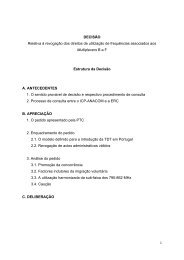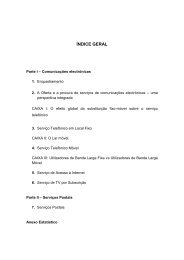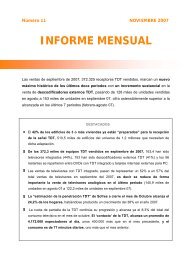The Price of Plurality - Stakeholders - Ofcom
The Price of Plurality - Stakeholders - Ofcom
The Price of Plurality - Stakeholders - Ofcom
Create successful ePaper yourself
Turn your PDF publications into a flip-book with our unique Google optimized e-Paper software.
32Robin FosterIn at least some <strong>of</strong> these areas emerging commercial alternatives tobroadcast television might provide enough diversity and choice toreduce the need for any public intervention in future. For example,the interest in local TV and broadband services from the newspaperpublishing sector. In any event, the existence <strong>of</strong> these gaps shouldnot automatically lead to the conclusion that they should be fi lled – athorough analysis <strong>of</strong> the costs, benefi ts and practicality <strong>of</strong> differentoptions for intervention is needed.A further general observation is worth making here. Given the range<strong>of</strong> new factual and other content available from a wide variety <strong>of</strong>providers on the internet, a new priority for PSB might be to help usersfi nd, understand and interpret that content, as well as commissioningnew content themselves. <strong>The</strong> BBC might, for example, be requiredto use its brand and approaches to packaging content to help usersreach many different types <strong>of</strong> content from many different sources;not just that commissioned or produced by the BBC.Distribution and navigationMy suggested third plurality outcome – ensuring ready access toPSB content – seems likely to be much easier to achieve in thenew broadband world than it ever was in a world <strong>of</strong> a few linearscheduled broadcast channels. <strong>Plurality</strong> <strong>of</strong> PSB provision in the oldmodel helped ensure people got access to PSB output by securing arange and diversity <strong>of</strong> programming on each channel. Current affairsprogrammes might be scheduled against soaps, documentariesagainst entertainment, news might be found at different times <strong>of</strong> theevening. Across the schedules as a whole, there was a reasonablechance that audiences could fi nd programming that they mightappreciate, and the presence <strong>of</strong> PSB programming on differentnetworks most likely increased its reach and impact.In the broadband world, linear broadcast schedules will becomemuch less important as a means <strong>of</strong> providing access to PSB content.While there might be less UK-made PSB content available on othermain broadcast networks, access to that content in different formsand on different media will be more convenient than ever before– for example via the BBC’s new iPlayer. 9 <strong>The</strong> introduction <strong>of</strong> the BBCiPlayer and other on-demand services will ultimately free viewersfrom the constraints <strong>of</strong> a linear schedule and allow them to accessPSB content when and where they want it. <strong>The</strong> BBC’s ultimate aimto make all <strong>of</strong> its archive available on-demand will complete thisprocess. It is no longer as important to have a range <strong>of</strong> PSB packagersto ensure that PSB content is readily available across the schedules– it will always be available, on demand. Equally, the application <strong>of</strong>sophisticated search tools to audiovisual content, coupled with thewider syndication <strong>of</strong> that content across many different internet sites,will enhance the effectiveness <strong>of</strong> its delivery.In conjunction with developments mentioned so far at other stagesin the value chain – direct access to content from programmeproducers, breaking down <strong>of</strong> international market boundaries,







